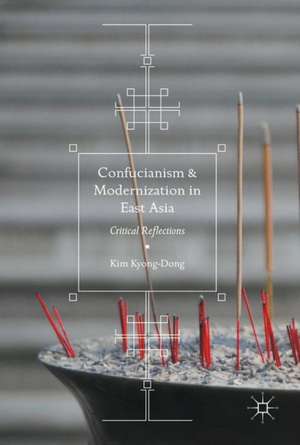Confucianism and Modernization in East Asia: Critical Reflections
Autor Kim Kyong-Dongen Limba Engleză Hardback – 15 mai 2017
Spanning the 19th and 20th centuries and identifying multiple waves of modernization, this book illustrates how principles originating in Chinese Confucianism have impacted the modernization of East Asia, especially in Korea. It also analyzes how such principles are exercised at personal, interpersonal and organizational levels. As modernization unfolds in East Asia, there is a rising interest in tradition of Confucianism and reconsider the relevance of Confucianism to global development.
| Toate formatele și edițiile | Preț | Express |
|---|---|---|
| Paperback (1) | 581.47 lei 43-57 zile | |
| Springer Nature Singapore – 29 iul 2018 | 581.47 lei 43-57 zile | |
| Hardback (1) | 586.88 lei 43-57 zile | |
| Springer Nature Singapore – 15 mai 2017 | 586.88 lei 43-57 zile |
Preț: 586.88 lei
Preț vechi: 690.45 lei
-15% Nou
Puncte Express: 880
Preț estimativ în valută:
112.30€ • 117.56$ • 92.92£
112.30€ • 117.56$ • 92.92£
Carte tipărită la comandă
Livrare economică 07-21 aprilie
Preluare comenzi: 021 569.72.76
Specificații
ISBN-13: 9789811036255
ISBN-10: 981103625X
Pagini: 136
Ilustrații: XXIII, 267 p. 6 illus., 1 illus. in color.
Dimensiuni: 148 x 210 x 18 mm
Greutate: 0.5 kg
Ediția:1st ed. 2017
Editura: Springer Nature Singapore
Colecția Palgrave Macmillan
Locul publicării:Singapore, Singapore
ISBN-10: 981103625X
Pagini: 136
Ilustrații: XXIII, 267 p. 6 illus., 1 illus. in color.
Dimensiuni: 148 x 210 x 18 mm
Greutate: 0.5 kg
Ediția:1st ed. 2017
Editura: Springer Nature Singapore
Colecția Palgrave Macmillan
Locul publicării:Singapore, Singapore
Cuprins
Confucianism and Modernization: Meta-Theoretical Discourse Analysis.- Confucianism and Modernization in East Asia Compared (I): The First Wave Modernization.- Confucianism and Modernization in East Asia Compared (II): The Second Wave Modernization.- The Aborted Confucian Reformation in Korea's Embryonic Modernization: The Case of Chŏng Yag-yong (1762-1836).- Is Confucianism Still Relevant Today? Closing Reflections.
Recenzii
“Kim’s book is a solid work that provides sound argumentation and abounds in important historical patterns that point to the recognition that Confucianism is, indeed, a major and lively religious and ethical tradition that is capable of operating efficiently behind the curtains in order to constantly form, inform, and reform societies that are facing the uncertainties of a modern(izing) world.” (Lehel Balogh, Religious Studies Review, Vol. 45 (2), June, 2019)
“This three-volume series is a magnificent synthesis of questions and debates over modernization, development and Confucianism in the context of Korea and East Asia. … In sum, the trilogy is a great accomplishment not only for the author, but also for the Korean sociological community, channeling their distinctive experience of modernization with global academia.” (Jaeyeol Yee, Development and Society, Vol. 46 (3), December, 2017)
Notă biografică
Dr Kim Kyong-Dong is Professor Emeritus of Sociology, Seoul National University, South Korea. The preeminent sociologist in Korea, he has devoted his career to analyzing and comparing "east" and "west" issues from a cultural perspective. After gaining his PhD at Cornell University in the US, Professor Kim was a visiting scholar in the US, Taiwan, France and a Fellow at the Woodrow Wilson Center for International Scholars, Washington, DC, as well as President of the Korean Sociological Association. He has widely published in English, Korean, Japanese and French on issues of development and modernization, social change and industrialization, sociological theory, education and religion.
Textul de pe ultima copertă
Spanning the 19th and 20th centuries and identifying multiple waves of modernization, this book illustrates how principles originating in Chinese Confucianism have impacted the modernization of East Asia, especially in Korea. It also analyzes how such principles are exercised at personal, interpersonal and organizational levels. As modernization unfolds in East Asia, there is a rising interest in tradition of Confucianism and reconsider the relevance of Confucianism to global development.
Caracteristici
Offers a new, original and relevant take on what Asia and Confucianism means to the intellectual worlds of the East and West. Uses the alternative theory of selective modernization in the process of international acculturation and adaptive change of indigenization of modernization in society. Considers changes in western attitudes towards Confucianism and its relevance to the process of modernization.









